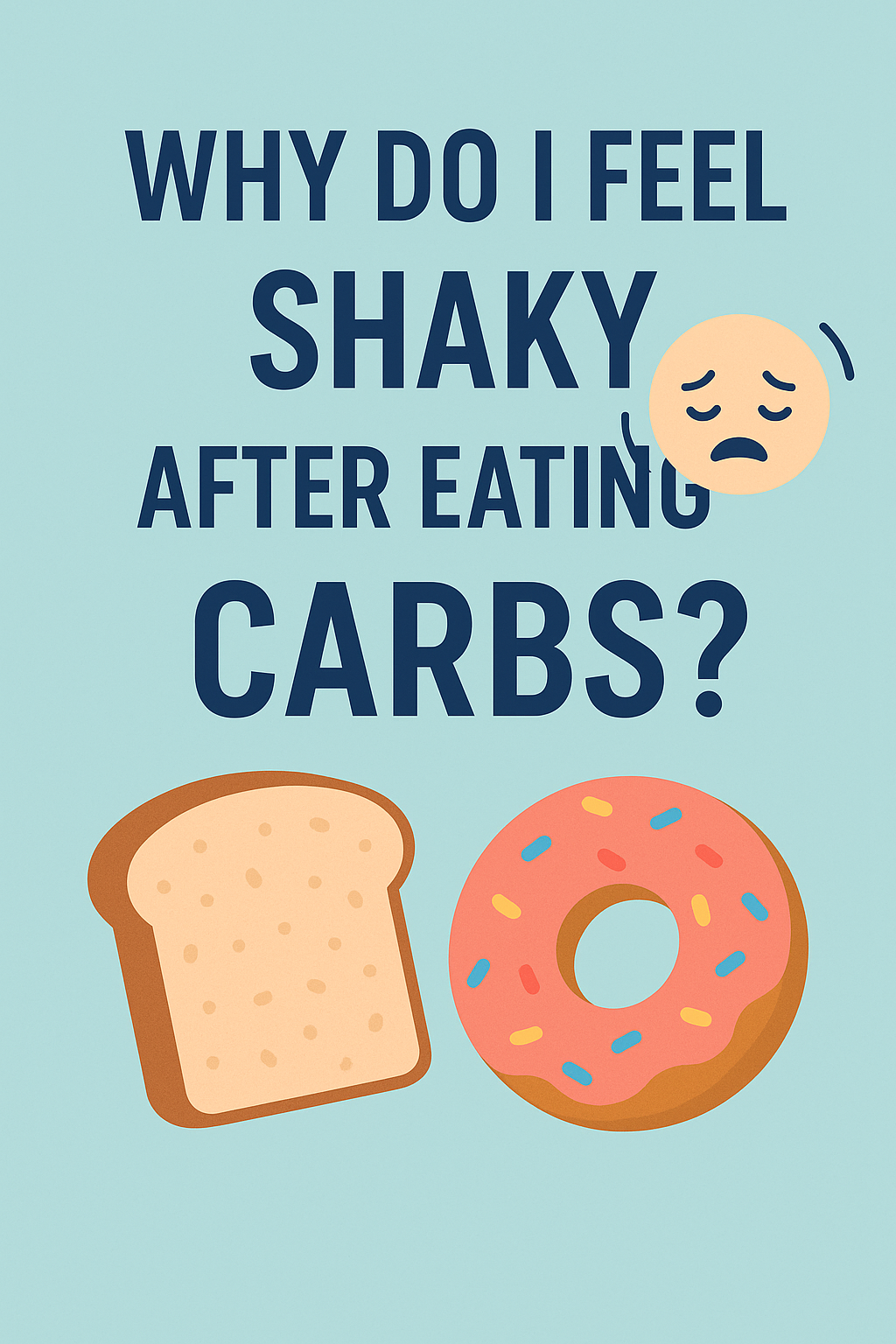
⚠️ Affiliate Disclaimer: This post may contain affiliate links, which means I may earn a small commission — at no extra cost to you — if you make a purchase through one of these links. I only recommend products or services I genuinely trust and believe can provide value. Thank you for supporting My Medical Muse!
Why You Feel Shaky After Carbs: 13 Surprising Causes
You grab a muffin, eat a bowl of rice, or sip a glass of juice, and then, not long after your hands tremble, your heart races, and you feel oddly lightheaded or anxious maybe even panicked.
What wrong? If you feel shaky after eating carbs, you’re not alone. Many people experience this strange, unsettling sensation and while it may seem like a random blood sugar “crash,” there are actually several potential causes from blood sugar imbalances to hidden health conditions, food sensitivities, or even stress hormones gone wild.
In this post, we’ll unpack 13 surprising reasons why carbs might make you feel shaky and what you can do to stop it.
Table of Contents:
- 1. Is It Normal to Feel Shaky After Eating Carbs?
- 2. What Happens in Your Body When You Eat Carbohydrates
- 3. 13 Possible Reasons You Feel Shaky After Eating Carbs
- 4. When to See a Doctor
- 5. How to Prevent Shakiness After Meals
- 6. Final Thoughts
Is It Normal to Feel Shaky After Eating Carbs?
In short: NO, it’s not typical but it’s also not rare, While some natural fluctuations in energy are normal after meals, feeling physically shaky, dizzy, anxious, or weak after eating carbohydrates may be a sign of:
- Blood sugar dysregulation
- Insulin resistance
- Hormonal imbalance
- A sensitive nervous system
- A nutrient deficiency
Let’s take a closer look at what’s going on inside your body when this happens.
What Happens in Your Body When You Eat Carbs?
Carbohydrates are broken down into glucose, your body’s main fuel source. When you eat carbs:
- Your blood sugar rises.
- Your pancreas releases insulin, a hormone that helps move glucose from your blood into your cells.
- Your cells use the glucose for energy or store it for later.
But sometimes, this delicate balance is disrupted especially if your body overreacts to carbs or struggles to regulate sugar levels. That’s when the shakiness, anxiety, and other symptoms can kick in.
13 Reasons You Feel Shaky After Carbs
1. Reactive Hypoglycemia (Postprandial Hypoglycemia)
This is one of the most common reasons, It occurs 1-3 hours after eating when your body releases too much insulin in response to carbs, causing your blood sugar to drop too low, too fast.
Symptoms include:
- Shakiness
- Sweating
- Fatigue
- Rapid heartbeat
- Irritability
- Brain fog
- Hunger or nausea
Common in people with:
- Pre-diabetes
- Insulin resistance
- PCOS
- High-carb, low-protein diets
2. High Glycemic Index (GI) Foods
Foods like white bread, soda, sugary cereal, and pastries spike blood sugar rapidly, which can lead to a sharp crash soon after. If you feel jittery after eating these, your body may be overcorrecting for the sudden glucose surge. Opt for low-GI options like oats, quinoa, lentils, sweet potatoes, or berries.
3. Low Blood Sugar Before Eating
If you skip meals or wait too long to eat, your blood sugar may already be low. When you suddenly eat carbs, the abrupt spike and drop can trigger:
- Shakiness
- Nausea
- Dizziness
Eat small, balanced meals every 3-4 hours to keep your blood sugar stable.
4. Caffeine and Carbs Combo
Had coffee with your muffin Caffeine stimulates your nervous system and can amplify feelings of shakiness especially if your meal is carb-heavy and low in protein or fat. Eat before coffee, or try switching to decaf while troubleshooting.
5. Stress or Anxiety Response
Sometimes, your shakiness isn’t about sugar at all, it’s a nervous system overreaction. Emotional stress or processed foods can trigger adrenaline and cortisol surges, mimicking low blood sugar symptoms like:
- Rapid heartbeat
- Anxiety
- Shaky hands
- Sweaty palms
This can feel exactly like a “crash” even if your glucose is normal.
6. Insulin Resistance
If your cells don’t respond well to insulin, your body may release more than needed, causing a rapid blood sugar drop.
Early signs of insulin resistance:
- Belly fat
- Sugar cravings
- Brain fog after meals
- Skin tags
- Feeling drowsy after eating
7. Food Sensitivities
Hidden food sensitivities (especially to gluten, dairy, or additives) can cause:
- Dizziness
- Anxiety
- Shakiness
- Palpitations
These may occur due to gut-brain axis disturbances or inflammatory reactions.
8. Dumping Syndrome
Common after gastric surgery, but can also happen in people with gut motility issues. When food rushes too quickly into the intestine, it causes:
- Shakiness
- Nausea
- Diarrhea
- Rapid heartbeat
- Also Read: Dumping Syndrome
9. Adrenal Fatigue or Dysregulation
Your adrenal glands help manage blood sugar and stress responses. If they’re worn out, you may struggle with energy crashes.
Signs include:
- Salt cravings
- Morning fatigue
- Crashing after meals
- Poor stress tolerance
Support tips:
- Rest and reduce stress
- Try adaptogens (e.g., ashwagandha, rhodiola)
- Take B vitamins
10. Dehydration or Electrolyte Imbalance
Carbs pull water into your gut, if you’re low on magnesium, potassium, or even sodium, you may feel:Shaky, nauseated, weak, dizzy. Stay hydrated and consider adding an electrolyte supplement if you’re sweating or exercising.
11. Vitamin or Mineral Deficiencies
Key deficiencies that may mimic blood sugar crashes:
- Magnesium – Needed for insulin and glucose metabolism
- Vitamin B12 – Critical for nerve function
- Chromium – Helps insulin work properly
- Zinc – Supports adrenal and immune function
A blood test or high-quality multivitamin may help.
12. Early Sign of Pre-Diabetes
Shakiness after meals could be an early red flag.
Other warning signs:
- Blurred vision
- Sugar cravings
- Excessive thirst or urination
- Fatigue
Ask your doctor about:
- Fasting glucose test
- Hemoglobin A1c
- Insulin sensitivity testing
13. Not Enough Protein, Fiber, or Fat With Carbs
Plain toast? Just fruit juice? Eating carbs alone causes sharp spikes and drops, but pairing them with protein, fiber, or healthy fat slows digestion and stabilizes glucose.
Try combinations like:
Apple and almond butter.
Oatmeal, chia and protein powder.
Brown rice, chicken and avocado.
When to See a Doctor
If post-carb shakiness is occasional, it may not be urgent but frequent episodes could indicate a deeper issue.
See a doctor if you also experience:
- Blurred vision
- Fainting
- Constant fatigue
- Heavy sweating
- Unexplained weight loss or gain
- Heart palpitations
Your provider might order:
- Glucose tolerance tests
- Continuous glucose monitoring (CGM)
- Insulin/cortisol testing
- Nutritional panels
How to Prevent Feeling Shaky After Carbs
Practical steps for smoother energy:
Never eat carbs alone, always add fat, fiber, or protein.
Choose whole, complex carbs like Sweet potatoes, brown rice, oats.
Avoid sugary drinks, ditch soda and juices.
Eat regularly -Small meals every 3-4 hours.
Start meals with protein like Chicken, eggs, tofu, beans.
Try apple cider vinegar -1 tsp in water before meals.
Walk after meals, take a 10-minute walk lowers blood sugar spikes.
Get morning sunlight, it Supports hormone balance and energy.
Stay hydrated especially important when you are on a low-carb diet.
Track your symptoms using a journal, it helps spot patterns.
Final Thoughts
Feeling shaky after eating carbs can be unsettling, but it’s not random. Whether it’s a blood sugar imbalance, nervous system sensitivity, or a hidden deficiency, your body is giving you clues. The good news? You don’t have to give up carbs entirely.
Start by balancing your meals, tracking your symptoms, and making mindful food choices. if the shakiness persists, a quick trip to the doctor might uncover something that’s easier to manage than you think.
👩⚕️ Need Personalized Health Advice?
Get expert guidance tailored to your unique health concerns through MuseCare Consult. Our licensed doctors are here to help you understand your symptoms, medications, and lab results—confidentially and affordably.
👉 Book a MuseCare Consult NowDr. Ijasusi Bamidele, MBBS (Binzhou Medical University, China), is a medical doctor with 5 years of clinical experience and founder of MyMedicalMuse.com, a subsidiary of Delimann Limited. As a health content writer for audiences in the USA, Canada, and Europe, Dr. Ijasusi helps readers understand complex health conditions, recognize why they have certain symptoms, and apply practical lifestyle modifications to improve well-being


